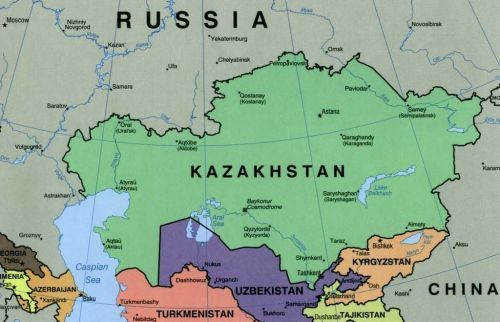Nur-Sultan Specialised Inter-District Criminal Court convicted 14 Kazakh men returned from Syria of working for terrorist organisation, the Islamic State or DAESH, and sentenced them to eight to 14 years in prison, reports The Astana Times.
These 14 men were returned to Kazakhstan as part of the national Jusan (Butter Wormwood) Operation, conducted from January to June. The operation retrieved 595 Kazakh citizens from Syria, including more than 400 children and 150 women. According to government data cited by Tengrinews.kz, the Kazakhs recruited to ISIS left mostly for Afghanistan, Iraq and Syria between 2012 and 2015, but there is no data on the actual number of people who left.
The trial, which started Oct. 22, evaluated charges against the 14 men of spreading terrorist propaganda, stirring social, national or religious hatred, participating in a terrorist organisation banned in Kazakhstan, and other crimes. Most of the men had lived in Syria for five to 10 years. Prosecutors asked for sentences from 10 to 17 years.

The defendants asked to be spared lengthy sentences. In their final statements, they expressed remorse for their crimes and gratitude for being returned. They urged the Kazakhs still in Syria to return home.
“Everything that happened to me will be a lesson for my whole life. A few years ago, I saw on the internet calls for help, so I went to Waziristan [a region of Pakistan that borders Afghanistan] and later to Syria. Going to help some people, I did not think about my relatives, parents. I put my wife and children in danger. This is my mistake,” said Amanzhol Zhansegirov, one of the convicted men.
He said he had decided to return home after an explosion near him killed 10 men, leaving him the only survivor.
“We were looking for a way back, but it was not easy. There was no opportunity, no money. We could get blown up at any moment, which happened to many people who were with us then,” said Zhansegirov.
The court asked him about a photo where he stood with a rifle next to severed human heads. The photo was taken after ISIS members executed men they had defeated in battle.
“After armed clashes, after some time, bodies of seven or eight people were brought in. ISIS has its own policy of cutting off heads and throwing them on the streets. I remember there was a crowd and I walked over. The crowd started taking pictures. I was ordered to be filmed in a video. I asked ‘Why?’ to which I received the answer ‘I am your amir, Abdulhafiz [Zhansegirov’s nickname], you must obey me.’ Then the amir ordered me to put my foot on a head. I did. He said to raise a hand. I did,” answered Zhansegirov.
He was sentenced to 12 years in a medium security colony. His lawyer said he would file an appeal.
“Zhansegirov himself is unhappy with the verdict of the court; with this regard I intend to appeal. He could not get a higher education for a long time. He could not get in the civil service for a long time. He could not prove himself as a citizen. In this regard, he, as a person, broke down and decided to prove himself in this way,” said the lawyer.
Another of the convicted men, Yermukhan Aiypkaliyev, was not able to be personally present in the court, but communicated by video from jail. While in Syria he was paralysed during a gunfight and cannot walk, sit up, or take care of himself. Aiypkaliyev said he had long since repented and had already received a severe punishment.
“One person under investigation agreed to take care of me, but he was transferred and he cannot come to jail. The jail head says there are no people who can take care of me and he cannot force the other persons under investigation to clean me. So I am laying… I am like a living corpse, only my head and heart work. Dear court, I do not have the health to serve 12 years in prison. You’d better sentence me to death,” he said.
He was sentenced to eight years in a medium security colony. All 14 men will start serving their sentences in two weeks, while appeals on certain cases are expected.
As a contribution to the resolution of the conflict in Syria, Kazakhstan’s capital hosts regular meetings of the “Astana Process” which was instrumental in consolidating ceasefire arrangement between the Syrian Government and the armed opposition though the establishment of de-escalation zones across the country.
